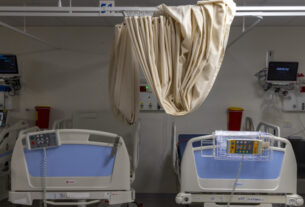“Amid the existential anxiety that has engulfed our entire nation, we are seeing a surge in questions regarding stress and its impact on the fetus,” Ella Talker, a doula and breastfeeding consultant, told Walla.
Talken is the brains behind the Nine Plus Life pregnancy app, which now offers 24/7 support to bring pregnant women together and assist them during one of the most sensitive times in their lives.
These women not only have to navigate the challenges of pregnancy but also endure the stress of war and the unknown.
Talker explained that many women experience guilt, struggle to feel happiness and find it difficult to eat, drink, and sleep properly. They even fear leaving their homes for routine check-ups. The anxiety surrounding the future also raises questions about their preparedness for childbirth. Talker emphasizes that these women feel alone in their struggles, as their concerns often don’t receive enough recognition besides the pain and loss felt by many in the country.
In Israel, approximately 180,000 women are currently pregnant, living in a state of fear and uncertainty during what should be a joyous time for them and their families.
Talker explained that every pregnant woman faces numerous questions even without the added stress of war. However, in the current situation, these concerns take on a whole new meaning, and the worries become even more challenging to manage.
An Israeli study exposed an increase in premature births due to the war
Research conducted at Soroka Hospital and Ben-Gurion University in 2016, two years after Operation Protective Edge, further reveals the toll that stress and anxiety during wartime can have on pregnancies. The study found a clear connection between the number of rocket alarms in the area where pregnant women lived and an increased prevalence of premature births and low birth weights.
Premature birth brings potential consequences for the baby’s life, including birth complications, developmental issues, and low birth weight. The study also highlighted the impact of alarms during different stages of pregnancy. Exposing pregnant women to alarms during the first trimester resulted in a 7.2% increase in premature births and a 2.5% increase in low-birth-weight babies compared to the previous year.
Alarm exposure during the third trimester led to a higher rate of “suspicious fetal monitoring” during childbirth, indicating potential complications related to the stress experienced by the mother.
Health Prof. David Shveiky, the Director of the Department of Women and Obstetrics at Hadassah, acknowledged that the country is in a challenging time. He emphasized the importance of providing support and answers to pregnant women who may be afraid to leave their homes or feel that their questions are not significant enough to consult a doctor.
To address these concerns, Hadassah is organizing a Zoom conference for pregnant women. The conference aims to create a safe space where participants can hear from experts, ask questions, and receive guidance to alleviate their worries.
The stressful situation, already accompanied by fears and uncertainties, is exacerbated by the hormonal changes that occur during pregnancy.
Talker said that persistent stress increases the levels of adrenaline and cortisol in both the mother and the fetus.
Studies have shown a link between maternal depression or chronic stress during pregnancy and attention and concentration disorders in children. Stress hormones can manifest in various ways, such as anxiety, trembling, uncontrollable hysteria, and repetition of words.
Oxytocin, known as the “love hormone,” can help balance the effects of adrenaline. Increasing oxytocin levels can be achieved through activities such as hugging for more than 20 seconds, eating chocolate or pineapple, taking a shower, using essential oils like lavender, and practicing slow and deep breathing.
Talker advises pregnant women to prioritize self-care, reduce news consumption, establish trusted sources for information, and connect with supportive communities.
She encouraged them to find productive activities, even volunteering, to give purpose and reasons to get out of bed.


